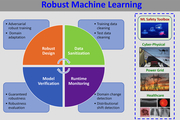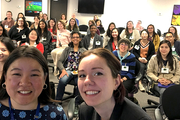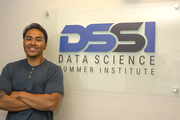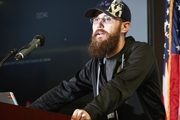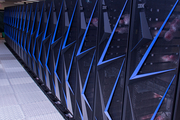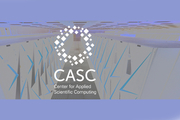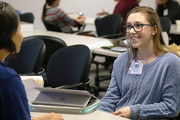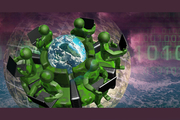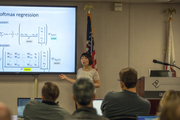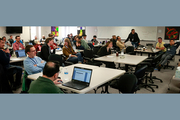Did you know we have a monthly newsletter? View past volumes and subscribe.
NeurIPS papers aim to improve understanding and robustness of machine learning algorithms
Dec. 7, 2020 -
The 34th Conference on Neural Information Processing Systems (NeurIPS) is featuring two papers advancing the reliability of deep learning for mission-critical applications at LLNL. The most prestigious machine learning conference in the world, NeurIPS began virtually on Dec. 6. The first paper describes a framework for understanding the effect of properties of training data on the...
Machine learning speeds up and enhances physics calculations
Oct. 1, 2020 -
Interpreting data from NIF’s cutting-edge high energy density science experiments relies on physics calculations that are so complex they can challenge LLNL supercomputers, which stand among the best in the world. A collaboration between LLNL and French researchers found a novel way to incorporate machine learning and neural networks to significantly speed up inertial confinement fusion...
DL-based surrogate models outperform simulators and could hasten scientific discoveries
June 17, 2020 -
Surrogate models supported by neural networks can perform as well, and in some ways better, than computationally expensive simulators and could lead to new insights in complicated physics problems such as inertial confinement fusion (ICF), LLNL scientists reported. Read more at LLNL News.
Lab team studies calibrated AI and deep learning models to more reliably diagnose and treat disease
May 29, 2020 -
A team led by LLNL computer scientist Jay Thiagarajan has developed a new approach for improving the reliability of artificial intelligence and deep learning-based models used for critical applications, such as health care. Thiagarajan recently applied the method to study chest X-ray images of patients diagnosed with COVID-19, arising due to the novel SARS-Cov-2 coronavirus. Read more at LLNL...
AI identifies change in microstructure in aging materials
May 26, 2020 -
LLNL scientists have taken a step forward in the design of future materials with improved performance by analyzing its microstructure using AI. The work recently appeared online in the journal Computational Materials Science. Read more at LLNL News.
Interpretable AI in healthcare (PODCAST)
May 17, 2020 -
LLNL's Jay Thiagarajan joins the Data Skeptic podcast to discuss his recent paper "Calibrating Healthcare AI: Towards Reliable and Interpretable Deep Predictive Models." The episode runs 35:50. Listen at Data Skeptic.
The incorporation of machine learning into scientific simulations at LLNL (VIDEO)
May 5, 2020 -
In this video from the Stanford HPC Conference, Katie Lewis presents "The Incorporation of Machine Learning into Scientific Simulations at Lawrence Livermore National Laboratory." Read more and watch the video at insideHPC.
Lab promotes diversity, tech at Women in Data Science regional event
April 3, 2020 -
For the third consecutive year, Lawrence Livermore National Laboratory (LLNL) hosted a Women in Data Science (WiDS) regional event on March 2. Held at the HPC Innovation Center, the event drew dozens of attendees from LLNL, Sandia National Laboratories, local universities, and Bay Area commercial companies.
Livermore was one of over 200 regional events in 60 countries coordinated with the...
Local Women in Data Science conference showcases Lab research
April 3, 2020 -
For the third consecutive year, LLNL hosted a Women in Data Science (WiDS) regional event on March 2. The event drew dozens of attendees from LLNL, Sandia National Laboratories, local universities, and Bay Area commercial companies.
Livermore was one of over 200 regional events in 60 countries coordinated with the main WiDS conference at Stanford University. According to the WiDS website...
Deep learning may provide solution for efficient charging, driving of autonomous electric vehicles
Feb. 4, 2020 -
LLNL computer scientists and software engineers have developed a deep learning-based strategy to maximize electric vehicle (EV) ride-sharing services while reducing carbon emissions and the impact to the electrical grid, emphasizing autonomous EVs capable of offering 24-hour service. Read more at LLNL News.
Department of Energy researchers share data management strategies at first-ever “Data Day”
Nov. 11, 2019 -
It’s become something of a mantra of the digital age: Data is the new currency. Especially in science, where it’s hard to find a single project that doesn’t involve generating or consuming massive amounts of data.
In light of the growing awareness of the critical importance of data management across the Department of Energy complex, more than 100 researchers from DOE national laboratories...
Livermore Lab Foundation awards scholarship to Cal State East Bay computer science student
Aug. 2, 2019 -
Alan Noun, a computer science student at Cal State University East Bay and the recipient of the Livermore Lab Foundation's first full-year scholarship, has started a summer internship at LLNL. In partnership with Cal State University East Bay (CSUEB), the Livermore Lab Foundation (LLF) awarded Noun a one-year stipend to allow him to devote more time to academics by reducing work he needs to...
Speech generation: siblings collaborate on machine learning hackathon project
May 28, 2019 -
The first recording that brothers Sam and Joe Eklund, along with their colleague Travis Chambers, played for the audience was a validation.
“I endorse Travis as president of the United States of America,” the audio clip played, in a voice resembling Barack Obama’s.
The second, in the same voice, was a declaration: “Ice is back, our brand new invention” (from the song “Ice Ice Baby” by...
How machine learning could change science
April 29, 2019 -
Artificial intelligence tools are revolutionizing scientific research and changing the needs of high-performance computing. LLNL has been exploiting the relationship between simulation and experiments to build predictive codes using machine learning and data analytics techniques. Read more at Data Center Dynamics.
CASC research showcased at major data science venues
March 20, 2019 -
Researchers from LLNL’s Center for Applied Scientific Computing (CASC) are among the Lab’s employees making waves in the data science community, with many prominent accolades, publications, and acceptances in 2018. Data science encompasses some of the hottest technology topics—machine learning (ML), “big data” analysis, artificial intelligence, computer vision, and more—and the Center’s...
Making connections, career development highlight Women in Data Science regional event
March 11, 2019 -
For the second straight year, the HPC Innovation Center at LLNL played host to a Women in Data Science WiDS) regional event on March 4, drawing in dozens of attendees from LLNL, local universities and other Bay Area national laboratories. Livermore was one of more than 150 regional events held at sites across the globe in conjunction with the Global WiDS conference at Stanford University. Rea...
ESGF conference caps a productive year
Feb. 12, 2019 -
Members of the Earth System Grid Federation (ESGF) gathered in Washington, DC, on December 3–7 for the 8th annual conference. The event packed 40 presentations, several plenary sessions, a poster session, guest speakers, an awards ceremony, and an executive committee meeting into the week. The Lawrence Livermore National Laboratory (LLNL) delegation comprised 19 staff from the Computation and...
Going deep: Lab employees get an introduction to world of machine learning, neural networks
Feb. 1, 2019 -
Deep learning is one of the most popular and widely used machine learning methods due to its success with autonomous vehicles, speech recognition and image classification, to name a few emergent technologies. But what exactly is deep learning, and how can it best be applied to Lab projects? LLNL employees discovered the answers during a recent "Deep Learning 101" course, which introduced the...
Dispatches from the fall hackathon
Dec. 18, 2018 -
This recap of LLNL's seasonal hackathon was provided by the web team that manages several LLNL websites. Mike Goldman, director of the Data Science Institute (DSI), stopped by the team's table during the hackathon to discuss the Open Data Initiative. Read more at LLNL Computing.
Playing video games may help researchers find personalized medical treatment for sepsis
Dec. 18, 2018 -
A deep learning approach originally designed to teach computers how to play video games better than humans could aid in developing personalized medical treatment for sepsis, a disease that causes about 300,000 deaths per year and for which there is no known cure. LLNL, in collaboration with researchers at the University of Vermont, is exploring how deep reinforcement learning can discover...

